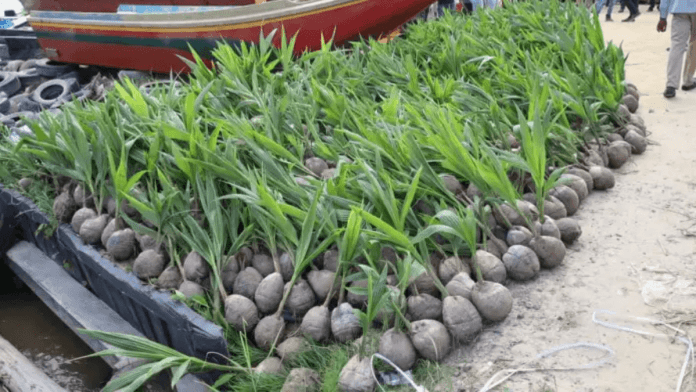News in Brief:
– Brazil’s agriculture ministry distributed 3,000 Green Dwarf coconut seedlings and three coconut shredders to Pomeroon farmers to boost coconut production and reduce waste.
– This initiative is part of a larger plan to distribute 7,000 seedlings, aiming to improve the quality and quantity of coconuts in Region Two.
In a significant move to bolster the coconut industry, the Brazil’s Ministry of Agriculture has distributed 3,000 Green Dwarf coconut seedlings to Pomeroon farmers in Region Two. This initiative, led by Agriculture Minister Zulfikar Mustapha, is the first phase of a larger plan to distribute 7,000 seed nuts to farmers in the region.
The Brazilian Green Dwarf coconut variety is known for its high yield. These seedlings are expected to enhance both the quality and quantity of coconuts produced. High-yielding crops are crucial for farmers worldwide as they promise better productivity and higher income.
The variety the farmers received is resistant to many common coconut diseases, reducing the need for chemical treatments. Also, trees start bearing fruits earlier than many other varieties, leading to quicker returns on investment.
Minister Mustapha’s visit and the subsequent distribution highlight the government’s commitment to supporting farmers. Less than six months ago, plans were announced to enhance coconut production in the Pomeroon area, showing swift action on these promises.
In addition to seedlings, the ministry distributed three coconut shredders, each valued at $1,800, in a bid to reduce wastage. The shredders will help process coconut shells, which are often discarded into the Pomeroon River, causing environmental issues. Benefits of coconut shredders include:
Shredded coconut shells can be used as mulch, which improves soil health and reduces the need for synthetic fertilisers. They can be sold or used in various industries, adding another revenue stream for farmers.
This initiative in Pomeroon is a blueprint for other regions globally. The combination of high-yielding varieties and technology to manage waste can transform the coconut industry, making it more sustainable and profitable. Farmers worldwide can adopt similar practices to improve their yields and reduce environmental impact.



